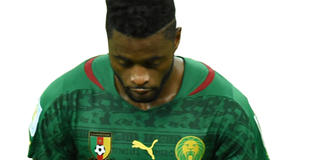Sub Saharan Africa must re-invent itself or ‘perish’

Cameroon's Song
What you need to know:
Historically, only one of Africa’s contingent has shone through at a time and managed to play beyond the group stages, with Morocco the first ever in 1986, then Cameroon in 1990, Nigeria in ’94 and ’98, Senegal in 2002, Ghana in 2006 and 2010.
It was freezing cold in the southern hemisphere around this time four years ago and, even if as hosts Africa owned the World Cup in most other aspects, the continent’s representatives did not take any advantages over, say, the European nations, onto the pitch.
In that sense, with typical tropical heat, rain oft times unannounced and the weather generally as unpredictable as it is fluctuating, Brazil 2014 was meant to be more of Africa’s World Cup than the South African edition.
It hasn’t quite turned out that way, with most if not all of our ambassadors almost certainly heading for the exit long before the third and final group matches have been played.
Historically, only one of Africa’s contingent has shone through at a time and managed to play beyond the group stages, with Morocco the first ever in 1986, then Cameroon in 1990, Nigeria in ’94 and ’98, Senegal in 2002, Ghana in 2006 and 2010.
This appears to be Ivory Coast’s turn, and even though I wrote this before their Thursday night clash with Colombia, it is in their last group game against Greece that I fancy the Elephants to do the trick.
Whether they do or not, the glaring failings of the rest have not gone unnoticed, and it is clear that over a decade since Brazilian legend Pele predicted that an African nation would win the World Cup, the hopefuls, especially sub-Saharan Africa, are trudging on in the opposite direction.
The player
A friend we dotingly call Elder insists that we are no longer developing players the right way, and I can’t agree more.
While that has been a teething problem in East Africa for decades, the West Africans were miles ahead and speeding on, but have slowed down and even ground to a halt. A trek across Europe will reveal that no elite club currently entrusts an African player with lead playmaking responsibilities except Man City and perhaps Valencia; Africa simply doesn’t have any other Yaya Toures or Sofiane Feghoulis going around.
Despite qualifying on several occasions since their 1990 heroics, it is long since Cameroon brought forward a player of Cyrille Makanaky’s playmaking skills, and you don’t see any new Lakhdar Belloumis, Jay Jay Okochas, Mutiu Adepojus or Stephen Appiahs coming through; neither are there pacy, ball-carrying wide men dictating matters from the flanks the way George Finidi, Emmanuel Amunike or Khaliolou Fadiga did at previous World Cups, Ghana’s Christian Atsu notwithstanding.
One of the biggest pointers towards the inadequate grooming of the sub-Saharan player at the Brazil World Cup has been the poor first touch (ball control) of the majority which has led to lost possession, bad tackles and all, even for a man like Alex Song whose recent addresses in Europe include Arsenal and Barcelona, clubs where technical quality is at the foremost of prerequisites.
Almost all the African players with the assured, polished technique, or at the very least a grasp of the simple basics at this World Cup have been nurtured in Europe, cue the Abedi Pele sons and Kevin-Prince Boateng for Ghana, Peter Odemwingie for Nigeria or Cameroon’s Maxim Choupo-Moting among others.
Look away from Brazil and what you will find as Africa’s best are the likes of Pierre-Emerick Aubameyang, reared in the AC Milan academy and buffed up in France and Germany.
With accomplished players like Mali’s Seydou Keita aging out, Africa now sends the hard-tackling ball winner, big central defender or burly, gangly striker to Europe, not your Rabah Madjer, Kalusha Bwalya or Pele of yester year.
The scorer
The dearth of well groomed African talent is not restricted to midfield technicians and trequartistas, but to consummate goal scorers as well.
While Africa has hundreds of strikers in Europe, you don’t quite see young Samuel Eto’os and Didier Drogbas littering the place, and the lack of natural goal scorers is largely the reason Ghana, Nigeria and Cameroon have not posted results they otherwise looked capable of in Brazil.
It is one reason I have fancied the Ivory Coast’s chances over the rest this time round, in the belief that they have enough firepower to get a result against Greece.
The tactician
Without delving too deep into the intricacies of strategy and dynamic game plan, I point to the simple chore of execution of corner kicks to underline Africa’s disappointing failure on that front, not necessarily by coaches but by the players who should know better. Against Iran, Nigeria took about a dozen corners without a single one beating the first defender or a green shirt attacking the near post, a scenario bizarrely replicated later when Ghana fell to the USA in a match they should have won.
Dead ball execution is but a must at major tournaments where creativity from open play can be stifled by the opposition, and chances can be few and far between.
For all their tiki taka as they dominated the 2010 World Cup, Spain needed a well-weighted corner kick and towering Carles Puyol header to get past Germany and into the final!
[email protected]
@markssali on twitter




